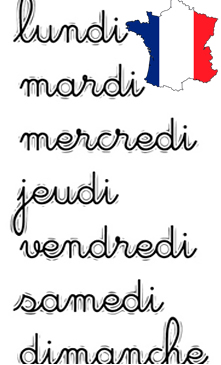Language/French/Vocabulary/Days-of-the-Week
7 Days of the Week
Il y a sept jours dans la semaine = There are seven days in a week:
- lundi = Monday
- mardi = Tuesday
- mercredi = Wednesday
- jeudi = Thursday
- vendredi = Friday
- samedi = Saturday
- dimanche = Sunday
The Days of the Week and Their Origin in French
The days of the week in French are deeply rooted in ancient Roman and Norse mythology, which have been adapted and transformed over time to reflect the linguistic and cultural evolution of France. Derived from Latin names, French days of the week maintain a unique connection to celestial bodies and mythological deities, offering insight into the historical and cultural significance of these terms. By understanding the origins of the French days of the week, one can appreciate the intricate tapestry of language, mythology, and history that weaves together the story of the French language.
Examples of common phrases
Asking about schedules and appointments
a. Quel jour avons-nous rendez-vous ? - On which day do we have an appointment?
b. Quand est ta réunion ? - When is your meeting?
c. Le cours de yoga a lieu le mercredi ou le jeudi ? - Is the yoga class on Wednesday or Thursday?
d. Quel jour préfères-tu pour notre déjeuner ? - Which day do you prefer for our lunch?
Discussing weekend plans
a. Qu'est-ce que tu fais ce samedi ? - What are you doing this Saturday?
b. Je vais au cinéma dimanche soir. - I'm going to the cinema on Sunday evening.
c. On se retrouve samedi pour faire du shopping ? - Shall we meet on Saturday for shopping?
d. Nous partons en week-end à la montagne vendredi. - We're going away for a weekend in the mountains on Friday.
Expressions (Lundi)
"Le lundi au soleil"
"A carefree life" (literally, "Monday in the sun"; refers to a famous French song)
Example: "Il a gagné à la loterie et mène maintenant une vie de lundi au soleil." - "He won the lottery and now leads a carefree life."
"Comme un lundi"
"Feeling sluggish or lacking energy" (literally, "like a Monday")
Example: "Je me sens fatigué et sans énergie, aujourd'hui c'est comme un lundi." - "I feel tired and low on energy, today feels like a Monday."
Expressions (Mercredi)
"Mercredi, tout est permis"
"Anything goes on Wednesday" (literally, "On Wednesday, everything is allowed")
Example: "Pour les enfants, mercredi, tout est permis." - "For the kids, anything goes on Wednesday."
Expressions (Vendredi)
"Vendredi 13"
"Friday the 13th"
Example: "Certains pensent que le vendredi 13 porte malheur." - "Some people believe that Friday the 13th is unlucky."
Expressions (Dimanche)
"être endimanché, être en habits du dimanche"
"To be very well dressed"
Example : "Ils se sont endimanchés pour aller au mariage."
"Un dimanche de pluie"
"A rainy Sunday"
Example: "On est resté chez nous, c'était un dimanche de pluie." - "We stayed at home because it was a rainy Sunday."
"Le promeneur du dimanche"
"A casual or occasional stroller" (literally, "the Sunday stroller")
Example: "Il n'est pas un randonneur sérieux, c'est plutôt un promeneur du dimanche." - "He's not a serious hiker, he's more of a casual stroller."
Expressions (jours)
"Vivre au jour le jour"
"To live day by day"
Example: "Depuis qu'il a perdu son emploi, il vit au jour le jour."
"Les jours se suivent et ne se ressemblent pas"
"Every day is different" (literally, "the days follow each other but don't resemble each other")
Example: "En vacances, les jours se suivent et ne se ressemblent pas." - "On vacation, every day is different."
VIDEOS
Other Lessons
- Greetings
- Resources
- Bathroom
- Tongue Twisters
- 100 Cents or Cent
- Differences between Sentir Se Sentir et Ressentir
- Nationalities
- Difference between Ancre and Encre
- False Friends
- Body


